- Home
- Elmore Leonard
Last Stand at Saber River Page 18
Last Stand at Saber River Read online
Page 18
First Luz would come, then Vern. Everything had happened just about the way it was supposed to and there was no reason for it to change now.
Finding Luz gone this morning had affected his nerves. He knew she had gone to see Cable, and he had pictured her telling him that the war was over. Then asking him if he was at home last night. Then why, she would ask, would Janroe lie and say you weren’t home? Then he had pictured Cable coming to the store.
But it had worked out all right. Vern was there before her. Vern seeking vengeance.
So now there was no chance of Cable finding out and eluding Vern or beating him or coming here. No, he would come here, all right, but not alive.
But this damn waiting…
Janroe paced the length of the space behind the counter, but it was too confining. He went out to the loading platform and for some time stood gazing out at the sunlit sweep of the valley; then at the willows and the slope beyond. He went inside again, through the store to the sitting room. From here he saw Martha still in the kitchen. Davis, the older boy, was with her, standing on a chair to put the breakfast dishes away.
He heard a noise from upstairs, then remembered that the other two children were up there. Martha had sent Clare up to make her bed and the younger one had gone with his sister. They’d probably forgotten all about the bed and were playing.
He was out on the platform again in time to see the rider come down the slope and drop from sight behind the willows. Waiting, Janroe was aware of the tight feeling in his stomach and the ache, the dull, muscle ache, in the arm that wasn’t there. But the next moment the tension and the pain were gone. He could feel only relief now, watching Luz appear out of the willows and come toward him across the yard.
He saw her watching him as she came, all the way, until she had reached the platform.
“What happened?”
“It’s over.”
“He’s dead?”
Luz glanced at the doorway behind them, then back to Janroe and nodded quickly.
“Where is he?”
“At home.”
“I thought Vern would be coming.”
Luz shrugged. “I don’t know.” She dismounted and came up on the platform. “I’d better go tell her.”
Janroe stepped aside. “Go ahead.” He said then, “You don’t seem broken up any.”
Luz said nothing.
“Didn’t Vern say he was coming?”
Luz shook her head. “I don’t remember.” She moved past him into the store.
Janroe followed. “Wait a minute. Tell me what happened.”
“After,” Luz said. She hurried now to the next room.
Janroe still stood at the edge of the counter after she was gone.
But why wasn’t she crying? She could be nervous about telling Martha, but she would have cried, if not now sometime before, and she would show signs of it.
From this the suspicion began to build in his mind. Why wouldn’t she tell what happened? She seemed to want to get away from him, to see Martha too quickly; not holding back, putting it off, reluctant to face Martha; but wanting to see her, to tell her…to tell her what?
He moved through the store in long, hurried strides, across the sitting room and saw them in the kitchen, Martha and Luz and the little boy: Martha looked at him, her eyes alive and her hand going to Luz suddenly to stop her. “What’re you telling her?”
Luz turned, stepping back as he came in. “Nothing. I was just beginning—”
“What did she tell you?” He turned to Martha abruptly.
“This doesn’t concern you, Mr. Janroe.”
“Answer me!” His hand clamped on Martha’s arm and he saw her wince, trying to pull away. “She said your husband was still alive, didn’t she? She said not to worry that he was all right, that he was coming.” Janroe shook her violently. “Answer me!”
He heard Luz moving. He wheeled, reaching for her, but she was already past him. “Luz—”
She ran through the store ahead of him, out to the loading platform and jumped. Janroe reached the doorway. He pulled the Colt, cocking it, and screamed her name again, a last warning. But beyond Luz he saw Cable step out of the willows with the Spencer in his hand. Then Vern, closer, running past the corner of the building. Janroe pushed back inside. He thought of Martha and ran into the sitting room in time to see her starting for the stairs. She reached the first step before she heard Janroe and turned to face him.
“You couldn’t leave the two upstairs, could you?” Janroe said.
Now they were in the willows watching the front of the store. Vern had been down farther, in view of the rear door, but he had come back as Luz ran out of the store and Janroe shouted at her.
“That nails it down,” Vern said. “He killed Duane. I wonder what he’s thinking, seeing us together.”
Cable, at the edge of the trees, said nothing.
Luz was staring vacantly at the adobe. “I shouldn’t have run,” she said. “I should be there with your wife and children.”
“You did the best thing,” Cable said.
“But I ran, leaving them alone with him.”
“We shouldn’t have let you do it,” Cable said.
“No,” Vern said. “It was the only way and it had to be tried. It was worth that much.” The plan had been for Luz to tell Janroe that Cable was dead. Then to tell Martha, somehow without Janroe hearing, to take the children and slip out. That would leave Janroe alone in the adobe and in time they would take him. But now they would have to think of something else.
“Where was Martha?” Cable asked Luz.
“In the kitchen.”
“The children with her?”
“Just Davis.” She looked at him then. “Could Clare and Sandy be outside?”
“They’d be close. But I haven’t seen them.” He glanced at Vern. “In back?” When Vern shook his head, Cable said, “Then they’re all inside.”
“He wouldn’t harm them,” Luz said. “He would be too afraid to do that.”
“Now he’ll be thinking of a way out,” Vern said.
“Unless he’s already thought of it.” Cable was still watching the adobe. “I think I’d better talk to him.”
Vern looked at him. “Just walk out there?”
“I don’t know of any other way,” Cable said. He parted the willow branches and started across the yard. Almost at once Janroe’s voice stopped him.
“Stay where you are!”
Luz’s horse, by the loading platform, raised its head at the sound.
Cable’s eyes moved from the screen door to the first window on the right. One of the wooden shutters was open. If Janroe was there he would be in the store, behind the counter that ran along the front wall. Cable started toward the adobe again.
“Stand or I’ll kill you!”
That’s where he was, by the window. Cable was sure of it now.
“Janroe, you’re in enough trouble. Let my family come out.”
There was no answer from the store.
“You hear me? Send them out and nobody will harm you.” He saw Janroe at the window then, part of his head and shoulder momentarily.
“How do I know that?” Janroe’s voice again.
“You’ve got my word.”
“I’ve got something better than your word.”
“Janroe, if you harm my wife and children—”
“I’m through talking to you, Cable!”
“All right”—Cable’s tone lowered, became more calm—“what do you want?”
“I’ll tell you when I’m ready. Go back where you were. Try sneaking up and you’ll hear a shotgun go off.”
Cable stared at the window, not moving.
“Go on!”
“Janroe,” Cable said finally, “if you harm my family you’re a dead man.” He turned then and moved back into the willows to stand with Luz and Vern.
Soon after, Luz’s horse moved away from the platform, the reins dragging. It wandered aimlessly at first, nosing
the ground; but finally the horse’s head rose and it came toward them, drawn by the scent of water.
Taking the reins, Luz looked at Cable. “He could threaten us to bring it back. Why doesn’t he?”
“He knows he can do it any time he wants,” Cable answered.
They waited, watching the store and seldom speaking. The afternoon dragged by and there was no word from Janroe; not a sound reaching them from the adobe.
In the late afternoon, with the first red traces of sunset, a rider came down the slope from the horse trail south. It was Manuel, back from Hidalgo. Back for good, he said.
He looked at Vern, then at Cable inquiringly and Cable told it, beginning with Duane and bridging to the present time. They had been here nearly six hours now, waiting for Janroe to make his move. There was nothing they could do. There wasn’t much doubt that Janroe would take a hostage when he decided to make his run. Probably one of the children. Probably, too, he was waiting for dark. But you couldn’t count on anything—it was Luz who added this—because something was wrong with the man’s mind. But Cable was sure Janroe would know they would hold back for fear of harming the child, and Janroe would lose them long before daylight.
The question then, what would he do with his hostage?
Cable said it bluntly, calmly, though his stomach was tight and he felt the unceasing urge through his body to move about and to do something with his hands. To do something.
It was Vern who brought up the question of the back door. “He can’t watch front and back both. Unless he locked the door.”
Manuel shook his head. “There’s no lock on it. But what if he heard you?”
“That’s something else,” Vern said.
The evening came gradually with dusk filtering into the willow grove before seeping in long shadows out toward the adobe store. There were faint sounds of birds up in the ridge pines, but close about them the willows were silent. Later on, perhaps, there would be a breeze and the crickets would begin. But now there was a silence that seemed never to end. They waited.
Luz and Vern sat close to each other and occasionally Cable would hear the murmur of their voices. Janroe had split them apart and now he had brought them back together. Maybe they would get married. Maybe some good would come out of this. Later on—days or weeks, sometime later—he and Vern would talk this out that was between them. Cable remained apart from the others, sitting near the edge of the river and watching the dark water.
After a while he began to think of something Vern had said, about the back door. And Manuel had answered that there was no lock on the door. “But what if he heard you?” Manuel had asked.
But, Cable thought, what if he didn’t hear you?
He pictured himself keeping to the trees until he had reached the barn, then creeping along its shadows, then across the yard and carefully, quietly, into the kitchen. It would already be dark inside the house. But if you bumped something—
No, he thought then, you know the place well enough. You could blind your eyes and walk through the house without touching or bumping anything.
Janroe wouldn’t expect anyone and there would be no sound. Janroe would be by the window watching Martha and the children, but glancing outside often. He would creep to the doorway that led into the store, see Janroe and be very sure of killing him with the first shot.
An hour passed. It was dark in the willows now and the last red traces of sun were gone from the sky. Cable kneeled at the sandy edge of the river to drink, cupping the water in his hands.
In the other time, Martha would be getting the children ready for bed now. They would come in and kiss him goodnight before Martha sat with them on the bed, their eyes wide and watching her, while she told them a story.
There had been a story the children liked and asked for often, about the little girl and her brother who were lost in the forest. When night came, the little girl began to cry and her brother put his arm around her. They sat huddled together, shivering with cold and listening to the night sounds. And when it seemed they could bear no more, neither the cold nor the frightening sounds, the little girl’s guardian angel appeared and led them through the forest to their home.
The children liked the story because it was easily imagined and because of the good feeling of being safely at home while they pictured themselves in the frightening dark.
Soon part of this story would come to life for one of his children. Janroe would take one of them as a hostage, because a child would be easier to handle than Martha. He would need only one horse and hold the child in front of him on the saddle, moving south toward the border and keeping to the wild terrain that offered good cover. But somewhere along the way, when he was sure he had lost the ones trailing him, when he no longer needed his hostage, Janroe would drop the child.
He would have no concern for the child’s life. There was no reason even to hope that he might. It could be Sandy. Three years old and alone somewhere in the vast, trackless rock country to the south. If they didn’t find him—and it would be almost as miraculous as the story if they did—the boy would survive perhaps two days.
So you have no choice, Cable thought. He would have to stop Janroe before he left the store.
Or while he was leaving it—
Cable pushed himself erect. Perhaps that was it. With the back door idea to make it work.
Perhaps as Janroe came out with the child in front of him. But it would be a long shot, too far, and even now there wasn’t enough light. But say Vern worked his way around to the side of the adobe and waited there. That could be done.
Janroe would come out, would call for one of them to come unarmed with a horse, threatening to shoot the child if he wasn’t obeyed. He would mount first and pull his hostage up in front of him. Or he would put the child up first. Either way, there would be a moment when Janroe would be seen apart from the child.
That was the time. You’ll be there, Cable thought. Through the store as he walks out, right behind him, and fire from the doorway, from close range.
But if the child was in the way then it would be Vern’s shot. Vern shooting from about fifty feet, in the dark.
There was no other way.
When he presented his plan to the others there were objections; but finally, after talking it out and seeing no alternatives, they agreed to it. After that each of them thought about what he would do.
Martha sat on an empty packing case with her arm around Davis next to her. It was dark in the store with the night showing in the doorway and in the window behind Janroe. The counter separated them. On it, pointed at Martha and the boy, was the shotgun. It was within easy reach of Janroe sitting on a high stool with the cold revolver in his hand.
Davis stirred, squirming on the wooden case, making it creak and causing Janroe to look at them. Martha’s hand, with her arm around him, patted Davis gently. There was no sound from the other children now.
They were still locked in the upstairs bedroom and through the long afternoon Martha had listened to the faint sounds of their crying. Perhaps they were asleep now, even though they were frightened and had had nothing to eat since breakfast.
That seemed such a long time ago.
First Luz coming, riding in with the excitement on her face and talking to Janroe. Then returning, coming into the kitchen and telling her that it was over and that Cable was alive.
Then Janroe. She remembered the fear, the desperation in his eyes as he herded them upstairs, pushing them to make them hurry. He made Davis go into the bedroom where Clare and Sandy were playing; but as if something occurred to him, he brought Davis out and locked the door. He herded them downstairs again; closed the kitchen door and kicked at it angrily when he saw it had no lock. From the kitchen he moved them into the store, where they now sat.
When Cable came out of the trees and Janroe called to him to halt, Martha stood up. She caught only a glimpse of her husband in the yard before Janroe ordered her to sit down. Once Cable’s voice rose threateningly and Martha
tensed, seeing the strained look of desperation come over Janroe’s face again.
But as the morning stretched into afternoon, Janroe seemed to gain confidence. Gradually his expression became calm and he sat quietly on the stool, his movements, as he looked from the yard to Martha, less nervous and abrupt.
Martha noticed it. She watched him closely, noting each change in his manner as he became more sure of himself. Occasionally, as he looked outside, her eyes would drop to the shotgun on the counter. It was five feet away, no more than that; but it was pointed at her. It would have to be picked up and turned on Janroe; while all he had to do was raise his revolver a few inches and pull the trigger.
Twice she asked him what had happened, why he was holding them; but both times he refused to talk about it.
Janroe came off the stool when Luz’s horse wandered from the platform to the trees. He stood at the window, his attention turned from Martha longer than at any time before. But finally he sat down again.
“My horse left me,” Janroe said, looking at Martha. “But all I have to do is call and they’ll bring it back.” He seemed to be reassuring himself.
Martha watched him. “Then you’re leaving?”
“In time.”
“Alone?”
“Now wouldn’t that be something.”
“I didn’t think so.”
“Your boy’s going with me.”
Martha hesitated. “Will you take me instead?”
Janroe shook his head. “Him. He’s big enough to hold on, little enough to be managed.”
Martha felt Davis close to her. She glanced down at his hand in her lap, then at Janroe again. “What will you do to him?”
“That’s up to him. Tell him if he cries or tries to run, I’ll hurt him something awful.” Janroe’s eyes moved from the boy to Martha. “He’s no good to me dead; least not while I’m getting away from here.”
“And after that?”
Janroe shrugged. “I suppose I’ll let him go.”

 Charlie Martz and Other Stories: The Unpublished Stories
Charlie Martz and Other Stories: The Unpublished Stories Elmore Leonard's Western Roundup #2
Elmore Leonard's Western Roundup #2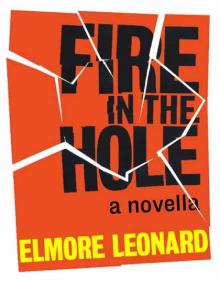 Fire in the Hole
Fire in the Hole Tishomingo Blues (2002)
Tishomingo Blues (2002)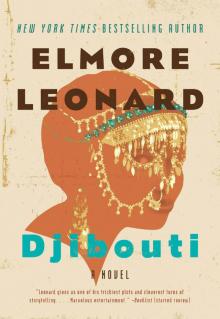 Djibouti
Djibouti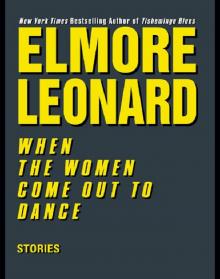 When the Women Come Out to Dance: Stories
When the Women Come Out to Dance: Stories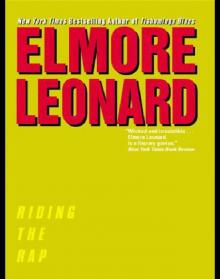 Riding the Rap
Riding the Rap Moment of Vengeance and Other Stories
Moment of Vengeance and Other Stories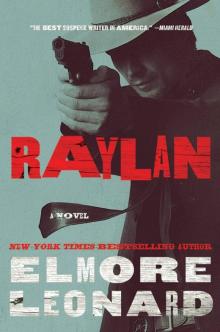 Raylan
Raylan Touch
Touch Mr Majestyk
Mr Majestyk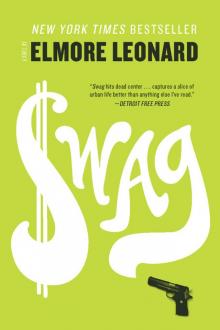 Swag
Swag Road Dogs
Road Dogs La Brava
La Brava The Hot Kid
The Hot Kid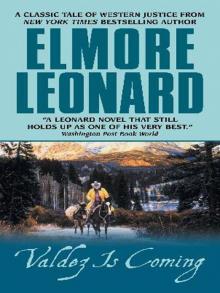 Valdez Is Coming: A Novel
Valdez Is Coming: A Novel Be Cool
Be Cool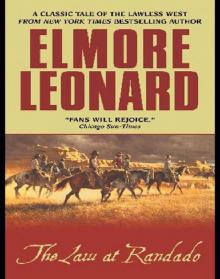 The Law at Randado
The Law at Randado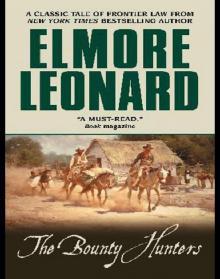 The Bounty Hunters
The Bounty Hunters When the Women Come Out to Dance
When the Women Come Out to Dance 310 to Yuma and Other Stories (1953)
310 to Yuma and Other Stories (1953)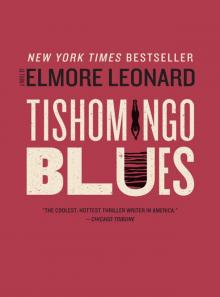 Tishomingo Blues
Tishomingo Blues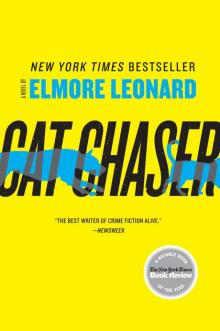 Cat Chaser
Cat Chaser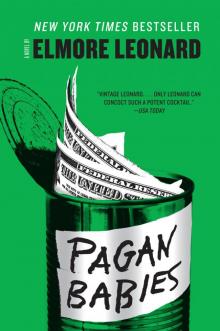 Pagan Babies
Pagan Babies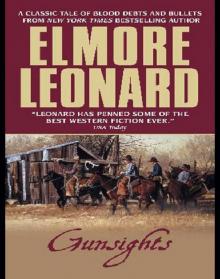 Elmore Leonard's Western Roundup #1
Elmore Leonard's Western Roundup #1 52 Pickup
52 Pickup Stick
Stick The Moonshine War
The Moonshine War Valdez Is Coming
Valdez Is Coming City Primeval
City Primeval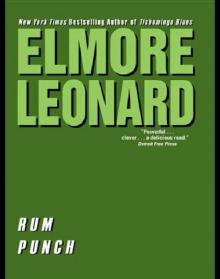 Rum Punch
Rum Punch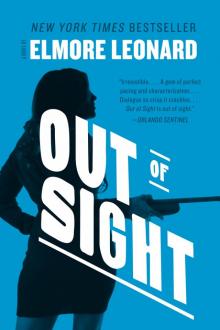 Out of Sight
Out of Sight Naked Came the Manatee (1996)
Naked Came the Manatee (1996)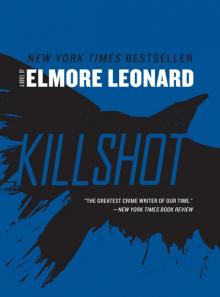 Killshot
Killshot Cuba Libre
Cuba Libre Forty Lashes Less One
Forty Lashes Less One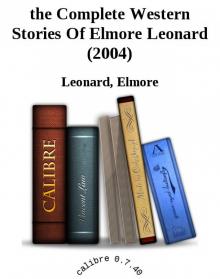 The Complete Western Stories of Elmore Leonard
The Complete Western Stories of Elmore Leonard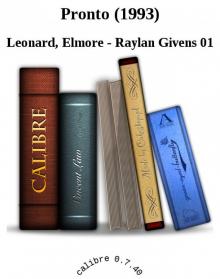 Pronto
Pronto Split Images
Split Images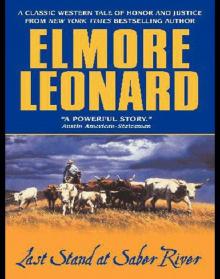 Last Stand at Saber River
Last Stand at Saber River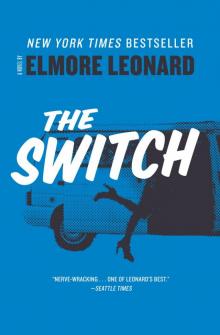 The Switch
The Switch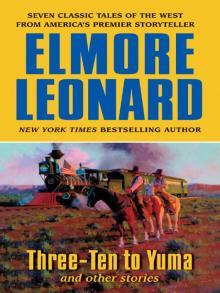 Three-Ten to Yuma and Other Stories
Three-Ten to Yuma and Other Stories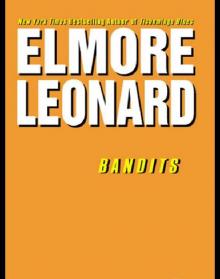 Bandits
Bandits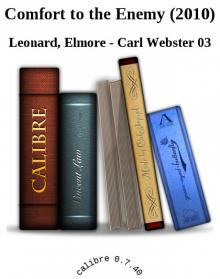 Comfort to the Enemy and Other Carl Webster Stories
Comfort to the Enemy and Other Carl Webster Stories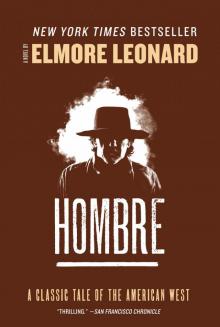 Hombre
Hombre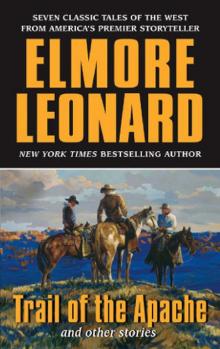 Trail of the Apache and Other Stories
Trail of the Apache and Other Stories LaBrava
LaBrava Gold Coast
Gold Coast Jackie Brown
Jackie Brown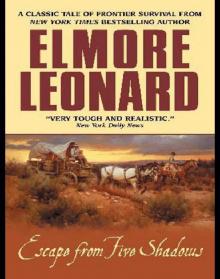 Escape From Five Shadows
Escape From Five Shadows Karen Makes out (1996)
Karen Makes out (1996)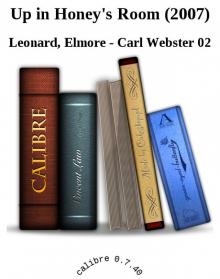 Up in Honey's Room
Up in Honey's Room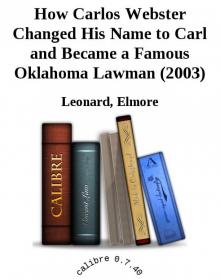 How Carlos Webster Changed His Name to Carl and Became a Famous Oklahoma Lawman (2003)
How Carlos Webster Changed His Name to Carl and Became a Famous Oklahoma Lawman (2003)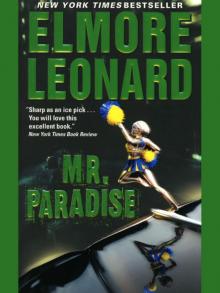 Mr. Paradise
Mr. Paradise The Hunted
The Hunted Freaky Deaky
Freaky Deaky Louly and Pretty Boy (Ss)
Louly and Pretty Boy (Ss)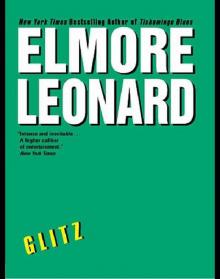 Glitz
Glitz A Coyote's in the House
A Coyote's in the House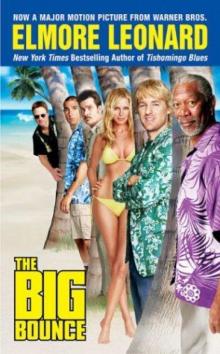 The Big Bounce jr-1
The Big Bounce jr-1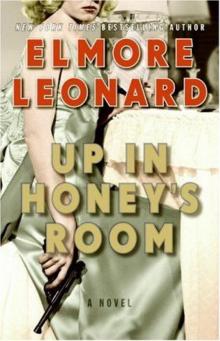 Up in Honey's Room cw-2
Up in Honey's Room cw-2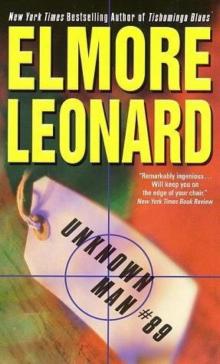 Unknown Man #89 jr-3
Unknown Man #89 jr-3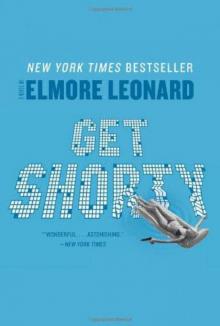 Get Shorty: A Novel cp-1
Get Shorty: A Novel cp-1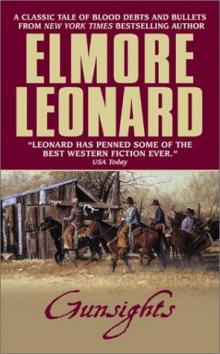 Gunsights
Gunsights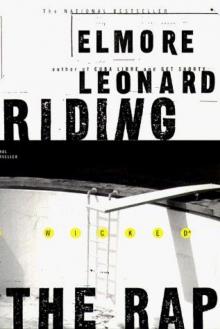 Riding the Rap rg-2
Riding the Rap rg-2